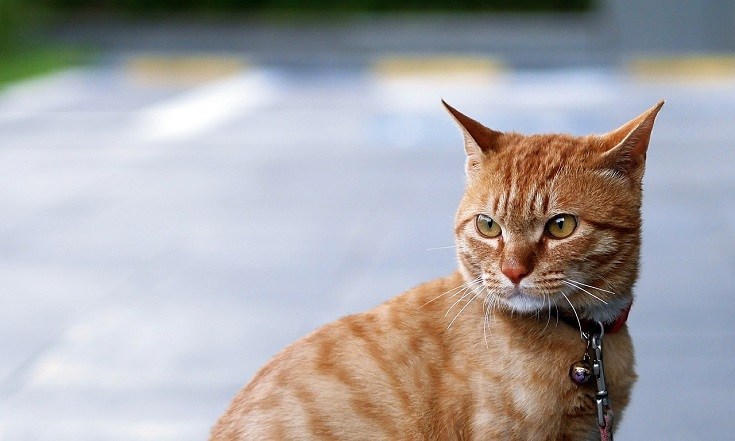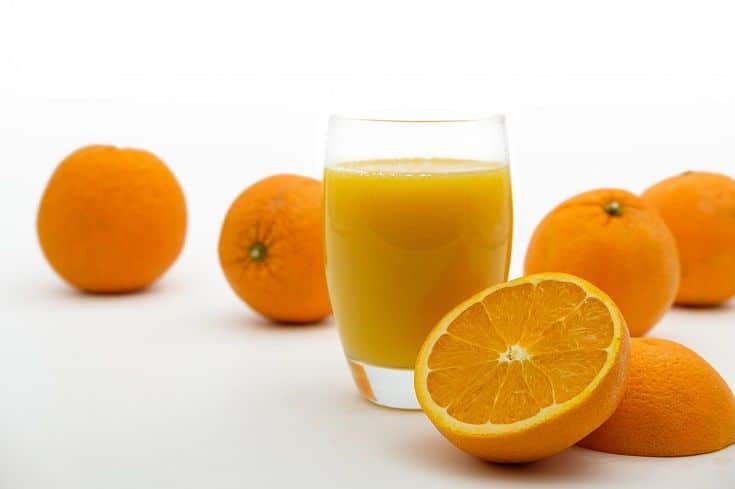Many of us like to share our food with our cats, and most people consider orange juice healthy and nutritious, so it’s only natural to wonder if it’s OK to allow your cat to drink a little orange juice now and then. The short answer is no. There are far too many risks to allow it in even small quantities. If your cat drank a little without your knowledge, it would probably be alright, but we hope you’ll join us while look at why you should never serve orange juice to your cat.

Is Orange Juice Bad for Cats?
Yes, orange juice is bad for cats for several reasons.
Citric Acid
While there is some evidence that citric acid is OK in small quantities, most experts agree that the citric acid in orange juice can upset your pet’s stomach. It can irritate the stomach lining, cause long term damage, and cause vomiting and diarrhea.
Essential Oils
The essential oils in oranges present a bigger danger to your cat than the citric acid. The concentration is higher in the leaves and stems of the tree, but essential oils are also in the fruit. Cats do not have the enzymes to process the oils, and symptoms of poisoning include difficulty breathing, drooling, weakness, muscle tremors, and vomiting. If you notice any of these symptoms in your cat, you’ll need to take the cat to the vet quickly, along with a sample of any essential oil they may have ingested.
Sugar
Orange juice is also high sugar, which can lead to obesity and promotes tooth decay. Cats cannot taste sugar, and their body lacks the enzyme to digest it. Dental disease is already very common in cats, and it’s a good idea to avoid adding any extra sugars to their diet.
Psoralens
Psoralens are a harmful compound found in orange juice that can cause your pet to become more sensitive to sunlight. Cats are especially susceptible to the effects of psoralens because they have thin skin that can burn easily if exposed. Psoralens can also cause skin rashes, indigestion, and even depression.

Allergies
Some cats are allergic to oranges and can suffer a reaction simply by being near the fruit or fruit tree. Even brushing up against the tree could cause swelling to occur in the face. Your cat can also have trouble breathing, and they could have a runny nose or eyes. Itching, scratching, and hives are also common symptoms of an allergic reaction.
Vitamin C
Most of us drink orange juice to increase the amount of vitamin C in our body, which will help boost the immune system to ward off disease. However, cats produce their vitamin C in their liver and do not need supplements unless directed by a veterinarian.
What should I do if my cat drinks orange juice?
Oranges, like many citrus fruits, are natural cat repellants. Cats have sensitive noses, and they don’t like the smell of oranges, so the chances are good that they won’t even go near an orange, much less drink enough of it to make them sick. However, if they do drink some orange juice, you will need to watch them for up to 24 hours to make sure they aren’t showing any symptoms of poisoning. The odds are good that your pet will be fine, but if you notice any strange behavior, it is important to take them to the vet as soon as possible.
DIY Cat Repellant
Because most citrus fruits naturally repel cats, you can create a natural and safe cat repellent to help keep your cats off furniture and can also reduce the number of stray cats that cut through your yard.
- 3 – 4 whole oranges
- One-quart water
- Pour the water in a 2-quart saucepan.
- Peel the oranges and place the rinds in the water.
- Bring the water to a boil.
- Cover and simmer for 20 – 30 minutes.
- Allow the solution to cool
- Remove and discard the orange rinds.
- Strain the remaining fluid to remove tiny particles
- Pour the solution into a spray bottle
- Spray the solution where you don’t want your cats to go.

When using this solution indoors, do so sparingly, so you don’t trigger any side effects. Try it in an out of the way area first, and if you can smell it, dilute it with more water. If using it outside to keep away strays, you can use a stronger solution, and you will need to reapply it every few days.

Summary
Unfortunately, orange juice is not one of the foods we can share with our pets. If your cat drank a little while you weren’t looking, it probably won’t do any damage, but you should never offer it as a treat or a drink. Oranges are great for preventing your cat from going where you don’t want it to go, and it’s effective on stray cats as well.
Featured Image Credit: Bru-nO, Pixabay





